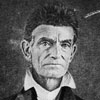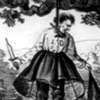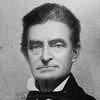
|
Opinions
About John Brown
|

Frederick
Douglass, image courtesy of the Library
of Congress
|
John
Brown's zeal in the cause of freedom was infinitely
superior to mine. Mine was as the taper light; his
was as the burning sun. I could live for the slave;
John Brown could die for him.
Frederick
Douglass
Douglass
was a nineteenth-century African-American abolitionist
who escaped from slavery and then risked his own
freedom by becoming an outspoken antislavery lecturer,
writer, and publisher. On August 16, 1859, Brown
met with Douglass and tried to convince him to join
him at Harpers Ferry. Just two months later, after
Brown's arrest at Harper's Ferry, authorities found
a letter from Douglass to Brown. Douglass fled to
Canada and then to a planned lecture tour of England
to escape arrest on charges of being an accomplice
in the raid. When he returned to the United States
in 1860, he was not charged in the raid.
|

Harry Truman,
image courtesy of Harry
S. Truman Library |
A
fanatic, a murderer, and a troublemaker. One of the
best things Robert E. Lee ever did was to hang old
John Brown
Harry
S. Truman |

Frances Ellen Watkins Harper,
image courtesy of Unitarian
Universalist Historical Society |
In
a letter smuggled into John Brown's prison cell, Watkins
wrote:
Although
the hands of Slavery throw a barrier between you and
me, and it may not be my privilege to see you in the
prison house, Virginia has no bolts or bars through
which I dread to send you my sympathy...I thank you
that you have been brave enough to reach out your
hands to the crushed and blighted of my race. You
have rocked the bloody Bastille; and I hope from your
sad fate great good may arise to the cause of freedom...
— Frances Watkins
Frances
Ellen Watkins Harper (1825-1911), was an African-American
writer, lecturer, and political activist, who promoted
abolition, civil rights, women's rights, and temperance.
John Brown was the principal at Union Seminary in
Ohio when Watkins taught sewing there.
|

John
Brown
reproduction of 1850s photograph(?) (c1899)
image
courtesy of the Library
of Congress
|
Mahala
Doyle sent this letter to Brown while he was in jail:
Altho'
vengeance is not mine, I confess that I do feel gratified
to hear that you were stopped in your fiendish career
at Harper's Ferry, with the loss of your two sons,
you can now appreciate my distress in Kansas, when
you then and there entered my house at midnight and
arrested my husband and two boys, and took them out
of the yard and in cold blood shot them dead in my
hearing. You can't say you done it to free slaves.
We had none and never expected to own one...My son
John Doyle whose life I begged of you is now grown
up and is very desirous to be at Charlestown on the
day of your execution.
— Mahala Doyle
On
May 24, 1856, John Brown traveled to Pottawatomie
Creek and directed his men in the murder of five
proslavery settlers including Mahala Doyle's husband
and two of her sons. Although proslavery forces
launched a manhunt, Brown evaded capture until the
raid on Harpers Ferry.
|
|

Lucius Bierce,
image courtesy of the City of Akron, Ohio.
|
When
Brown was hanged in December 1859, Lucius urged that
courts and businesses in Akron be closed, and mourning
bells tolled for a solid hour across the town. At
a rally, he gave Brown a rousing send-off, praising
him as "the first martyr in the irrepressible
conflict of liberty with slavery."
Lucius said:
Thank
God I furnished him with arms, and right good use
did he make of them. Men like Brown may die, but their
acts and principles will live forever.
Lucius
Bierce
Lucius Bierce was a founding member of the state
Republican party and the mayor of Akron, Ohio six
times from 1839 to 1868. He was an ardent abolitionist,
and he financed anti-slavery efforts. One of his
friends and neighbors in Akron was John Brown. As
an attorney, Lucius was well acquainted with Brown
who also happened to be a co-religionist in the
local Congregational church. When Brown left Ohio
for Kansas, he took with him, compliments of Lucius
Bierce, a wagonload of arms and ammunition somewhat
questionably appropriated from a disbanded militia
store. Included in the haul were the broadswords
that Brown and his henchmen would use to butcher
three members of the Doyle family, proslavery settlers
on the banks of Pottawatomie Creek, Kansas, a few
months later.
|

Lithograph
Last
scene of all, that ends this strange eventful history,
image courtesy of the Library
of Congress |
Though
it convert the whole Northern people, without exception,
into furious, armed abolition invaders, yet old Brown
will be hung! That is the stern and irreversible decree,
not only of the authorities of Virginia, but of the
PEOPLE of Virginia, without a dissenting voice...The
miserable old traitor and murderer belongs to the
gallows, and the gallows will have its own.
Richmond
"Whig" newspaper editorial quoted in the "Liberator",
Nov. 18, 1859
|

Henry David Thoreau,
image courtesy of the Library
of Congress |
I
am here to plead his cause with you. Some eighteen
hundred years ago Christ was crucified; this morning,
perchance, Captain Brown was hung. These are the two
ends of a chain, which is not without its links. He
is not Old Brown any longer; his is an angel of light.
Henry
David Thoreau
Henry
David Thoreau (July 12, 1817 – May 6, 1862)
was an American author, pacifist, tax resister and
philosopher who is most famous for Walden, his essay
on civil disobedience, and appreciation for nature.
He was a lifelong abolitionist, delivering lectures
that attacked the Fugitive Slave Law, praised the
writings of Wendell Phillips, and defended radical
John Brown.
|

John
Brown
Engraving from daguerreotype,
i mage courtesy of the National
Archives and Records Administration
|
Now,
if it is deemed necessary that I should forfeit my
life, for the furtherance of the ends of justice,
and MINGLE MY BLOOD FURTHER WITH THE BLOOD OF MY CHILDREN,
and with the blood of millions in this Slave country,
whose rights are disregarded by wicked, cruel, and
unjust enactments, — I say LET IT BE DONE.
John
Brown
|

Abraham Lincoln
photographic print by Alexander Gardner, image courtesy
of the Library
of Congress |
Old
Brown has just been executed. We cannot object even
though he agreed with us in thinking slavery wrong.
That cannot excuse violence, bloodshed, and treason.
Abraham
Lincoln
Abraham
Lincoln (February 12, 1809 – April 15, 1865)
was the 16th President of the United States (1861–1865),
and staunchly opposed the expansion of slavery into
federal territories. His victory in the 1860 presidential
election further polarized the nation and led to
seven Southern slave states seceding from the United
States to form the Confederate States of America.
These events soon led to the American Civil War.
|
|
|
Copyright
Digital History 2021
|
|
|
